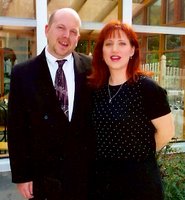A Joseph In His Generation
R.G. LeTourneau
No Job Too Big
When the Allied powers marked the 50th anniversary of D-Day this summer, much of the world watched re-marked film footage of the June 6, 1944, invasion of Europe.
Accompanying the largest invasion force ever assembled onto the beaches of Normandy was an equally impressive display of machines and equipment, much of it built by the energetic, American businessman R.G. LeTourneau.
A big man with a big heart for God, LeTourneau had always done things in a big way. His company designed and built some of the world's most massive machinery—earth movers, transporters, missile launchers, bridge builders and portable offshore drilling rigs. If a task needed to be done faster, smarter, and bigger, LeTourneau could usually be found on the job.
"Remember that there are no big jobs," he said, describing his flair for colossal endeavors, "only small machines and small thinking." His capacity to think and act on a grand scale made LeTourneau an internationally recognized industrialist. Yet he always attributed his success to the Lord. He typically began his talks to students and businessmen by saying: "I'm just a mechanic that God has blessed, and it seems He wants me to go around telling how He will bless you too."
LeTourneau's success came at the price of many early failures and setbacks. It was these humbling years that formed the backdrop to his salvation and "partnership with God" in business.
LeTourneau dropped out of school at age fourteen and went to work shoveling sand and dirt at an iron works factory in Portland, Oregon. Even at this early age, his mind was busy thinking of how to do the job more efficiently. By sixteen, he had grown into a large, muscular young man. And though these two years of labor with street-savvy men had educated him in the ways of the world, they had hardened his heart to the things of God. What he didn't know was that his devoutly Christian parents had been praying for his salvation daily.
The week before Christmas in 1904, the city of Portland had a crusade, and LeTourneau decided to attend. "What terrified me was that after a week of concentrated singing, and listening to sermons, I didn't feel even a tremor of response." That concern led to a humble plea for God's help. "No bolts of lightning hit me. No great flash of awareness. I just prayed to the Lord to save me, and then I was aware of another presence."
The following years were turbulent. LeTourneau moved to California where he worked almost forty odd jobs. At twenty-eight, he married a girl twelve years younger. They lost their first child in infancy, and he broke his neck in a stock car crash. Due to an inept partner in a Stockton, California, repair shop, he was $5,000 in debt by age thirty-one. Disengaging himself from the garage, he promised to repay his indebtedness to a trusting banker. When the banker asked how he would repay, he simply held up his two hands. Impressed by his determination and honesty, the banker agreed to extend the loan, so LeTourneau bought a tractor and scraper and went into the earth-moving business.
Stubborn, willful, and self-reliant by nature, LeTourneau refused to give up. His struggle to make his faith in Christ relevant to his life and work led him to attend a revival at his church. It was there he prayed: "Lord, if You'll forgive and help me, I'll do anything You want me to do from this day on."
Feeling renewed, LeTourneau wondered how God would use him. He visited the preacher early the next morning, and the pastor told him: "You know, Brother LeTourneau, God needs businessmen as well as preachers and missionaries." That was all LeTourneau needed to hear. In the book, More Than Conquerors, a collection of biographical sketches of Christian men and women in history, it is noted of LeTourneau: "In our high-tech age today, machines - really big machines that push and pull, lift and move, scrape and dig—are not too popular anymore. However, without the kinds of machines that R. G. LeTourneau dreamed of . . . the technological age we are now in might never have happened at all." Yet as significant as his contribution to industry was, his commitment to "do whatever God wanted him to do" left a legacy of trusting faith, godly generosity, and compassion. For many years, he lived on ten percent of his income and gave away ninety percent to Christian work, especially missionary efforts in Africa and South America. Even when his business was in financial jeopardy, he continued giving his sacrificial pledges to Christ's work. "The question" he said, "is not how much of my money I give to God, but rather how much of God's money I keep for myself."
Throughout his life, LeTourneau emphasized God's ability to help the common man with everyday problems. He founded a university in Texas that bears his name and formed a foundation that funds many Christian ministries. Before his death in 1969 at age seventy-nine, LeTourneau said: "Everything considered, I've had my share of ups and downs, but thus far my life has been a miracle of God's grace all the way through."



0 Comments:
Post a Comment
<< Home